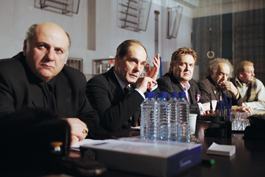home | metro santa cruz index | movies | current reviews | film review

TOUGH CROWD: Getting an innocent verdict out in '12' is no easy task.
Trial by Jury
The Russian feature '12' puts an Eastern spin on classic jury drama '12 Angry Men.'
By Richard von Busack
FULSOME, windy and yet somehow strangely interesting, the Oscar-nominated Russian film 12 shows that no one will ever master the art of the harangue as well as those who dwell on the east side of the Urals. The film is a stagy palimpsest of the American jury-room drama 12 Angry Men, filmed twice here, once famously by Sidney Lumet and once for television by William Friedkin.
In this version, the hot-button topic is again racism. A Chechen punk (Apti Magamaev) is on trial for his life in Moscow, where he supposedly knifed a former Russian Army officer. Adding to the cloudiness of the case is a veritable 52-pickup game of class-card playing. It's dead winter; the deliberation room is a high school gym, commandeered by the government for jury sequestering. A ratty, Soviet-era heating pipe rumbles and groans across the ceiling. We cross-cut to the Islamic prisoner, taken out of his cage of white enamel-painted rebar and tossed into a cell to await sentencing.
In flashback we see the Chechen's own experience of life in a war zone, little understood by the jurors deliberating his fate. They're all male, all white Russian, all middle-aged. (I had the same reaction to watching this version of 12 Angry Men as I did to watching all previous versions. This is a jury of peers? Someone seriously screwed up the voir dire.)
What seems like a slam-dunk sentencing for life in prison is interfered with by a soft-spoken, Richard Jenkins-like electrical engineer, played by Sergei Makovetsky. He has his doubts about the young man's guilt and decides to be the lone holdout.
For various personal and prejudicial reasons, the other 11 members are slow to follow the engineer's lead. And the choleric voice in favor of the prosecution is a bull-like Moscow cab driver (Sergey Garmash, a Slavic Lee Marvin) who doesn't like the defendant any more than he likes the defendant's race. Soon joining the engineer in his opposition is a Jewish juror (Valentin Gaft); he is old-school, like the warm-hearted Jews in 1950s American movies.
What's interesting in 12 is not the plot. This warhorse plot works no matter how you load it, with aggravation levels rising, and burning cigarettes crackling like the fuse on a bomb. It's not the rigor of debate and the sense of reasonable doubt being expanded upon, either.
In this version of the play, we get evidence that somehow was slept through or kept out of the courtroom. Unlike some of the classic courtroom dramas, we don't get a hand in picking through the evidence and figuring out who the killer was. The 12 jurors essentially retry the case with fresh evidence while they're sitting in the room--they figure it all out through common sense.
As the accused murderer is onscreen, rather than off-screen as in previous versions, we're on his side. Mikhalkov's staging of the war scenes is effectively brutal and loud--a visceral condemnation of Russia's Forever War in Chechnya. Slices of flashback tell us the boy's story. He is rendered homeless after his house is demolished and his mother is killed.We have the sense that no refuge is safe enough for the Chechen boy.
Condemning the nouveau riche who are letting their country rot, Mikhalkov applies thick Russian humor. One of the jurymen, played by the Carl Reinerish Yuriy Stoyanov, comes across as the old caricature of a perfume-spraying Harvard-educated capitalist.
The jury can be clownish, horsing around with a student's discarded bra or making some heavy jokes about one juror's young girlfriend. A chirping sparrow flies into the room and represents the better angel of these quarrelers' nature--the bird gets cute reaction shots and eventually lets fly on the cabbie's head. The camera work is nimble and rapid, and the cast members react well to each other, like a team that has been playing the material onstage for a year.
Every point has a counterpoint. When the Communist Party is denounced as the source of all criminality--"They lied for privilege, for power and out of habit"--someone else replies that he had a relative who was a functionary in the party, and he wore himself out until he died of anxiety. Another confesses to work- place corruption--of an elaborate trick for scamming bereaved widows. But he pleads mitigating circumstances, in that he sends the scammed money back to his poor village. "Is it different where you work?" he asks the jurors, and of course, the audience as well.
This one-two punch of guilt and extenuation only seems like controversy. The real skill in making a drama is making us understand someone's criminal behavior even without explanation. The ambient corruption of post-Communist Russia in 12 is thick enough that everyone watching would understand why people do what they must to survive. Still, 12 bravely puts up its damning accusation against the lawlessness, cronyism and sloth that's kept Russia crippled since ancient times.
![]() 12 (159 min.), directed by Nikita Mikhalkov and starring Sergei Makovetsky, plays at selected theaters.
12 (159 min.), directed by Nikita Mikhalkov and starring Sergei Makovetsky, plays at selected theaters.
Send a letter to the editor about this story.
|
|
|
|
|
|